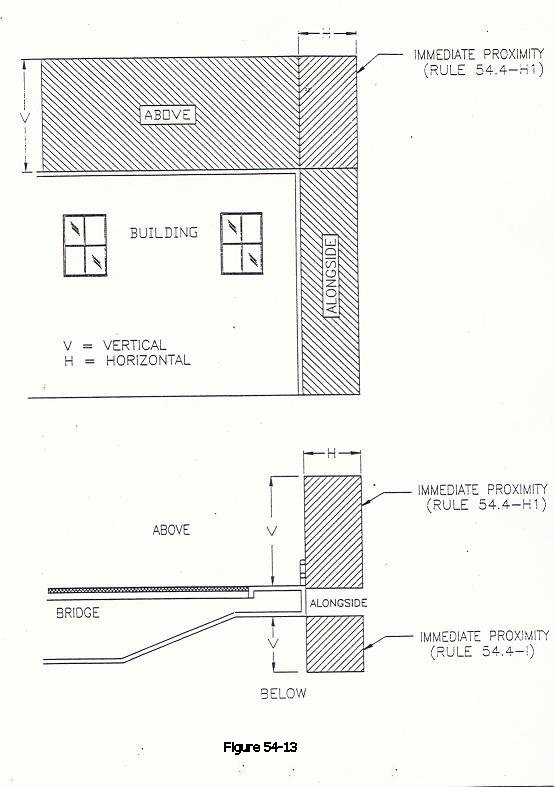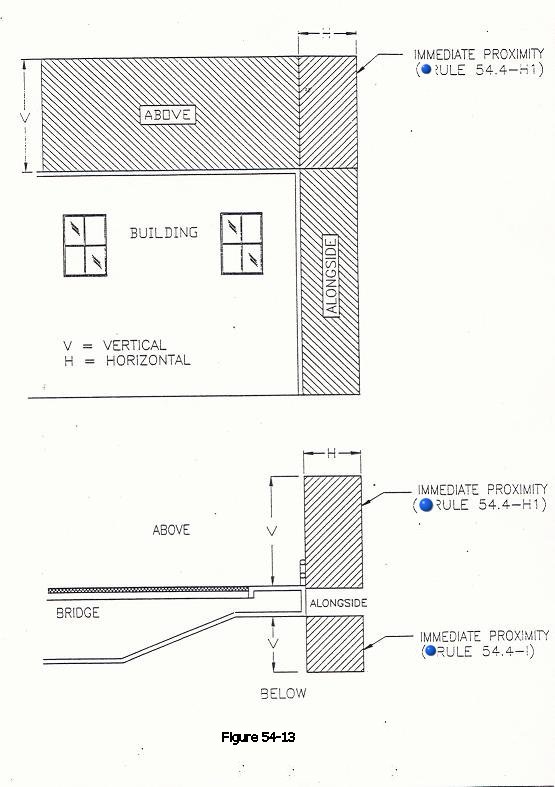
Original Version
Rule 54.4-H1
54.4-H1)
Unattached Conductors: Conductors shall
be so arranged as to hamper and endanger fireman and workmen as little as
possible in the performance of their duties.
The basic clearances of conductors from buildings are specified in Table
1, Cases 6 and 7. The requirements of
Table 1, Cases 7 also apply at fire escapes, exits, windows, etc., at which
human contact may be expected.
Where the vertical distance above
ground of conductors of 7500 volts less is in excess of 35 feet, the horizontal
clearances front eh buildings may be less than 6 feet (Table 1, Case 7, Column
E) but shall be not less than 4 feet.
See Rule 54.8-B4 for service drop clearance requirements.
For special treatment
of bus and lead wires of transformer installations in alleys, etc., see rules
58.3-B2.
Strikeout and Underline Version
Rule 54.4-H1
54.4-H1)
Unattached Conductors: Conductors shall
should be so arranged so as not
to hamper and or
endanger workers fireman and workmen firefighters as
little as possible in the performance of while performing their
duties. The basic clearances of
conductors from buildings are specified in Table 1, Cases 6 and 7. The horizontal clearance (Table 1, Case
7) shall be maintained until the vertical clearance (Table 1, Case 6) is
attained (see Fig. 54-13). The
horizontal clearance The requirements
of Table 1, Cases 7 also apply at fire escapes, exits, windows, etc., at which
human contact may be reasonably expected.
Where the vertical distance above
ground of conductors of 7500 volts less is in excess of 35 feet, the horizontal
clearances front eh buildings may be less than 6 feet (Table 1, Case 7, Column
E) but shall be not be less than 4 feet.
See Rule 54.8-B4 for service drop clearance requirements.
For special treatment
of bus and lead wires of transformer installations in alleys, etc., see rules
58.3-B2.

Final Version
Rule 54.4-H1
54.4-H1)
Unattached Conductors: Conductors should
be arranged so as not to hamper or endanger workers and firefighters while
performing their duties. The basic
clearances of conductors from buildings are specified in Table 1, Cases 6 and
7. The horizontal clearance (Table 1,
Case 7) shall be maintained until the vertical clearance (Table 1, Case 6) is
attained (see Fig. 54-13). The
horizontal clearance The requirements
of Table 1, Cases 7 also apply at fire escapes, exits, windows, etc., at which
human contact may be reasonably expected.
Where the vertical distance above
ground of conductors of 7500 volts less is in excess of 35 feet, the horizontal
clearances front eh buildings may be less than 6 feet (Table 1, Case 7, Column
E) but shall not be less than 4 feet.
See Rule 54.8-B4 for service drop clearance requirements.
For special treatment
of bus and lead wires of transformer installations in alleys, etc., see rules
58.3-B2.
